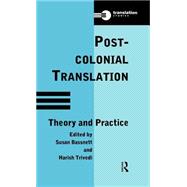Summary
This outstanding collection brings together eminent contributors to examine some crucial connections between postcolonial theory and translation studies. As English becomes an increasingly global language, more people become multilingual and translation becomes a crucial communicative activity. The essays in this book, by contributors from Britain, the US, Brazil, India and Canada, examine the relationships between language and power across cultural boundaries, and reveals the vital role of translation in redefining the meanings of culture and ethnic identity. Contributors: Rosemary Arrojo, Ganesh Devy, Vinay Dharwadker, Andre Lefevere, G.J.V. Prasad, Sherry Simon, Nathaniel Tarn, Maria Tymoczko, Else Ribeiro Pires Vieira, Vanamala Viswanatha.
Table of Contents
| Acknowledgements |
|
ix | |
| Notes on contributors |
|
x | |
| Introduction: of colonies, cannibals and vernaculars |
|
1 | (18) |
|
|
|
|
|
|
|
|
|
|
|
Post-colonial writing and literary translation |
|
|
19 | (22) |
|
|
|
|
|
|
Writing translation: the strange case of the Indian English novel |
|
|
41 | (17) |
|
|
|
|
|
|
Translating and interlingual creation in the contact zone: border writing in Quebec |
|
|
58 | (17) |
|
|
|
|
|
|
|
|
75 | (20) |
|
|
|
|
|
|
Liberating Calibans: readings of Antropofagia and Haroldo de Campos' poetics of transcreation |
|
|
95 | (19) |
|
Else Ribeiro Pires Vieira |
|
|
|
|
|
A.K. Ramanujan's theory and practice of translation |
|
|
114 | (27) |
|
|
|
|
|
|
Interpretation as possessive love: Helene Cixous, Clarice Lispector and the ambivalence of fidelity |
|
|
141 | (21) |
|
|
|
|
|
|
Shifting grounds of exchange: B. M. Srikantaiah and Kannada translation |
|
|
162 | (20) |
|
|
|
|
|
|
|
|
|
|
|
Translation and literary history - an Indian view |
|
|
182 | (7) |
|
|
|
|
|
| Bibliography |
|
189 | (10) |
| Name Index |
|
199 | |

 eCampus.com Device Compatibility Matrix
eCampus.com Device Compatibility Matrix

